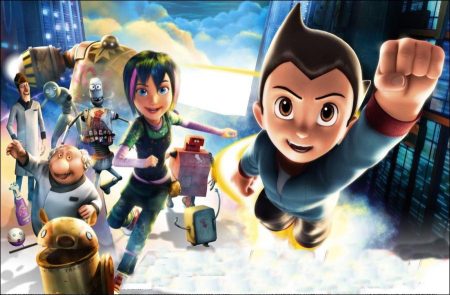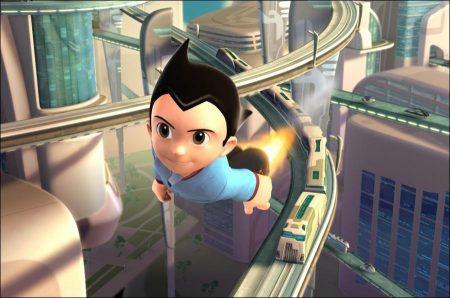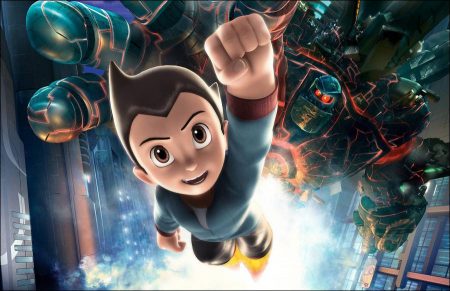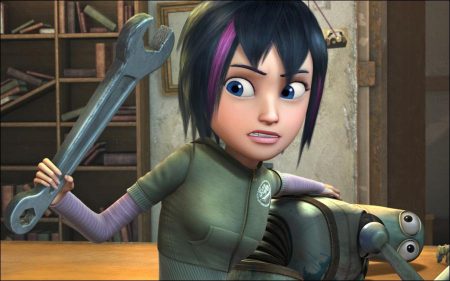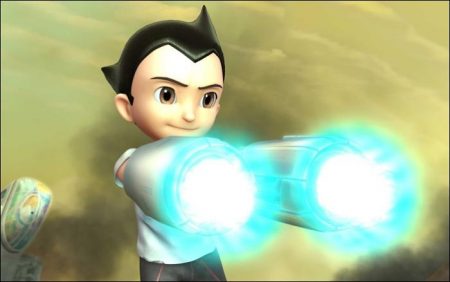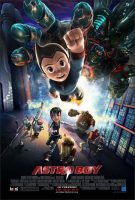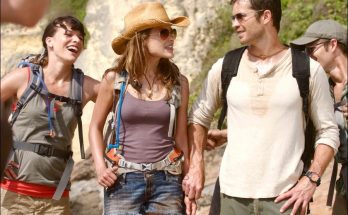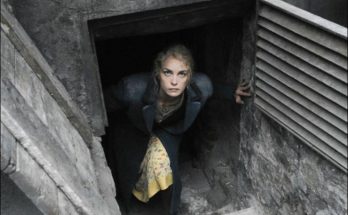Astro Boy is a classic superhero origin story. The all-new, CG animated feature film tells the story of a young robot with incredible powers and his adventure-filled journey in search of his identity and destiny.
In the futuristic world of Metro City, a gleaming metropolis in the sky, the brilliant scientist Dr. Tenma creates Astro Boy to replace the son he has lost, programming his creation with the best of human characteristics and values, as well as endowing him with extraordinary super powers. Cast out when he cannot meet the grieving father’s expectations, Astro Boy is dealt a cruel double blow – he is also crushed to learn he is a robot, not even a human being.
Presented by Summit Entertainment and Imagi Studios, Astro Boy is directed by David Bowers (Flushed Away) and stars Freddie Highmore, Kristen Bell, Nathan Lane, Eugene Levy, Matt Lucas, Bill Nighy, Donald Sutherland, Samuel L. Jackson and Nicolas Cage as “Dr. Tenma”. With a screenplay by Timothy Harris and David Bowers, from a story by Bowers, the film is based on “Astro Boy,” the manga created by Osamu Tezuka. Producer is Maryann Garge. Cecil Kramer, Ken Tsumura, Paul Wang and Francis Kao are executive producers. Music is by John Ottman.
The film was a flop in Japan, appearing at the bottom of the opening week’s Top 10 rankings and earning only $328,457. Conversely, the film was very successful in China, breaking a box-office record for a CG animated film. This follows the same pattern as Dragonball Evolution and Speed Racer, other American-produced films based on Japanese sources that were not big hits in the land of their origin but were very successful in China. The film also was a box office bomb in the U.S., opening at #6, grossing $6.7 million, where it remained in the Top 10 for three weeks. When it closed in January 2010, it had a total gross of $20 million. Due to these factors, the film would only produce a worldwide gross of $44.6 million against a $65 million budget.
About the Story
Astro Boy, who carries within himself the Blue Core, a power source made of positive “blue” energy, is sought out by the troops of the militaristic President Stone, obsessed with obtaining the Core for the “Peacekeeper” robot, in fact invented to be used as a weapon to dominate Earth.
Fleeing from the military, Astro Boy crashes to the surface of the Earth. Lost and unsure of his identity, Astro Boy simply seeks to fit in. Denying his true nature, he tries to pass himself off as a human being with a gang of child-vagabonds. He falls naively under the sway of their leader Hamegg, in whom he sees a father figure. To Astro Boy’s horror, Hamegg exposes him as a robot and tries to turn him into a robot-gladiator.
In the Battlebot arena, Astro Boy is forced to face wave upon wave of robots. Refusing to fight, but only disabling his opponent when the safety of spectators is threatened, Astro Boy’s nobility wins the crowd over. Alerted by the Core’s power surge, the military swoops down and captures Astro Boy, who resigns himself to his fate. As Dr.Tenma, the man who created him, removes his energy source, Astro Boy forgives him for what he is doing. This display of innate goodness finally opens Dr. Tenma’s eyes to the terrible mistake he has made.
Reconciled to the son he had wrongly rejected, he allows Astro Boy to escape. The destructive Peacekeeper, which has been given the incredibly dangerous negative Red Core energy by presidential order, is out of control and causing havoc in Metro City. Astro Boy returns to help the citizens, fighting the Peacekeeper and saving Metro City from crashing to Earth. In the climactic battle, the strands of the story come together as Astro Boy accepts his mixed human-robot nature and finds his destiny as mankind’s savoir.
About the Production
Few animated characters have made as powerful or as lasting an impression on international popular culture as Astro Boy. The little robot first appeared in 1951 as a character in Osamu Tezuka’s legendary manga (Japanese comic book) and became an instant icon. In 1963, he starred in a black and white television series produced in Japan.
With his large expressive eyes, Astro Boy became the standard for a new form of animation that has become world famous as anime. The original series also garnered a devoted following when it debuted in the U.S. that same year. Astro Boy continued to inspire fans in a 1982 television series, and then again in an American-made series that debuted in 2003.
Airing in 40 countries, including Japan and the U.S., this third series appeared on the WB and Cartoon Network, winning first place in its time slot for two years running. Tezuka has been honoured as both the “god of manga” and “father of anime,” and Astro Boy and his creator became such enormous celebrities in their native Japan that they even appeared on postage stamps. In 2004, Astro Boy was inducted into the Robot Hall of Fame alongside Star Wars’ C-3PO and Robby the Robot from Forbidden Planet.
Astro Boy’s story, with its themes of displacement and the need to belong, touched director David Bowers. “Astro Boy is a timeless story in the tradition of Pinocchio or Oliver Twist,” he says. “It’s very Dickensian, but at the same time, it’s very modern. He is a child created to replace the son that a father has lost. The father comes to realize that the boy can’t truly replace his lost son. The boy, who thought he was a real kid, finds out he’s a robot, and from there his life just goes crazy.
“Thinking back to films I’ve loved and that have really influenced me over the years, I realized that the first movie I saw in a theatre was Pinocchio,” says Bowers, an animation veteran who previously directed Flushed Away for DreamWorks and Aardman Features. “My father took me to see it and it had an enormous impact. `When You Wish Upon a Star’ makes me cry to this day.”
Then, when he was researching Astro Boy, Bowers learned that Osamu Tezuka was highly influenced by the work of Walt Disney. “It was easy to see where Astro Boy came from. There are all sorts of similarities with Pinocchio-except he’s improved it with giant fighting robots!”
Staying faithful to the original “Astro Boy” while updating its sensibility for a 21tst century audience was a central concern for everyone involved with the film, says Maryann Garger, the film’s producer. “Astro Boy is a national treasure in Japan. He is their Mickey Mouse. We wanted to create that same excitement and passion for the character in Western audiences. “I think viewers who know the character will see Astro Boy’s story in a way they haven’t seen it before,” she adds. “On the other hand, if you’re new to Astro Boy, it’s an incredibly emotional story. It’s sort of Pinocchio, but it’s also Star Wars. And it’s not just for kids. It’s for grownups, too, and hopefully moviegoers around the world will discover that.” Bowers is confident that long time fans will be happy with this updated AstroBoy.
“He is still the Astro Boy we know and love, except this is the first time on the big screen, so it’s a much bigger story. It has much more scope and much more scale, even in things like the emotional aspects of Astro Boy’s journey.” But while Astro Boy has a poignant side, the filmmakers have not skimped on the action-or the humour, says Bowers. “We have Astro Boy flying down the streets, cars blowing up, buildings collapsing. We have flying cities crashing to the ground. It’s heart-warming, but at the same time very exciting and very funny, too.”
While Garger admits she did not grow up with Astro Boy, she says it was love at first sight. “His is a very enriching story, a wonderful emotional journey and a great, great character. It’s easy to understand how he became a worldwide icon.”
Actor Freddie Highmore, who voices the pint-sized superhero, points toward Astro Boy’s innate altruism as one reason for his enduring popularity. “He’s a real superhero in that he uses his powers for good,” says Highmore. “There are so many people in the world who are very clever or talented in some way. They usually use their gifts for their own benefit. Astro Boy never puts himself first. He goes to save the whole world.
“Astro Boy is the individual who sets out to change the society,” the actor continues. “In our world, just like in his, there are so many rules and restrictions that make it hard for the individual to make a difference, but that’s what Astro Boy always tries to do.”
The opportunity to direct Astro Boy was too good an opportunity for Bowers to pass up, he says. “My job, first and foremost, is to be a storyteller. I helped harness the creative energies of all these amazing people surrounding me to get the story out there as something that people can enjoy. I hope that it’s something that will be around for a while. If we can move people, if we can make people laugh and make people cry, then I think we’ve done our job. If we can excite them and have them at the edge of their seats, too, then we’ve done our job really well.”
Putting together the best project possible meant assembling an all-star creative team, says the director. “We managed to get these amazing talents to work on our film.
Everybody was committed to making Astro Boy the most spectacular, fantastic, exciting and funniest film movie that we could possibly create.
The film is produced by Imagi Studios, a Hong Kong-based animation studio with a creative development and production facility in Los Angeles and an office in Tokyo. The company’s first major CG-animated theatrical movie, TMNT, was released domestically March 23, 2007 by Warner Bros. and opened No. 1 at the box office. “Imagi has all these great artists from around the world who are very passionate,”
Bowers adds. “A lot of top creative people that I worked with at other studios are there, so it really felt like we were getting the band back together. I was thrilled to be reunited with Maryann Garger, who was the co-producer of Flushed Away.” Garger echoes his enthusiasm. “Imagi is especially exciting for me because we have an opportunity to help build the studio,” she says. “That was something I loved doing when I was at DreamWorks. Because Imagi is a start-up studio, there’s a lot of artistic energy which translates to the screen. We have made a film that we’re very proud of that will compete in today’s global marketplace.”
The film’s screenplay is by Bowers and Timothy Harris, a seasoned writer whose credits include such hits as Trading Places and Kindergarten Cop as well as the blockbuster animated action comedy Space Jam.
Bowers says that as a parent, he was particularly excited to be making Astro Boy. “My daughter is only two years old, but when I started sketching at home and thinking of ideas for Astro Boy, she asked me what it was. I told her and now, when I come home at night, I have to draw Astro Boy for my daughter. “When kids go to the movie theatre to see Astro Boy, I hope it will be an amazing experience for them,” the director says. “But when they come out of the movie theatre, I want that experience to expand into their everyday lives. That’s how Astro Boy is in Japan, and I’d love for it to be that in the United States.”
Giving Voice to Astro Boy
At the age of 17, Freddie Highmore has a resume any actor would envy, but AstroBoy is his first foray into superhero status. Working on the film was an education for Highmore, who was not initially familiar with the character. “It was exciting to learn about this whole new world,” he says. “Sometimes I feel like we know this huge secret, and we’re about to go and tell all these people about it.”
Highmore voices both Toby and Astro Boy in the movie, giving him the additional challenge of creating two similar, but distinct, characters. “It was really interesting to play,” he says. “They are quite different. “All great characters change through the course of a movie,” he notes. “Astro Boy definitely learns many things about himself and about how to live in the world. He realizes that he has all these amazing powers. As he discovers his powers, the audience discovers them as well and hopefully they go through the emotions with him.” One of the things that attracted Highmore to the project was its innovative approach to animation. “It’s quite original and it’s got a modern feel to it,” he says.
“They kept some of the traditions of manga, but altered them slightly. Everyone has their own image of Astro Boy and so nothing is going to be exactly like the manga or exactly like the TV show, but the original core of the characters is still there. It is definitely something new, but fans will be able to recognize the old faces and see the characters come to life in a different way.”
Nicolas Cage, who voices Dr. Tenma, Astro Boy’s father, says he grew up watching the original black and white “Astro Boy” television series. “There was a tremendous amount of emotion in those little Japanese cartoons,” he remembers. “I couldn’t take my eyes off of it. There was this marvellous charm in seeing somebody that small be that powerful. I think that’s something that a lot of children can get in step with.”
Cage once hoped to make a live action feature based on the character. “It wasn’t something that ever got off the ground,” he says. “But Mr. Tezuka sent me a little wooden clock with all his characters carved into it. Even though I never met the man, I had personal connection to him, which was part of the reason I chose to participate in this movie.”
The key to Astro Boy’s popularity, says Cage, is his inherent humanity. “I love Astro Boy’s good-heartedness, his wanting to belong, wanting to be loved, even though he’s this little robot. You can’t help but adore the character, because you feel so much for him. Those things separate Astro from other anime.”
Cage also has compassion for the character he plays, although Tenma initially rejects his creation. “Dr. Tenma is a tragic character. He has lost his child and he thinks he can use his knowledge of robotics to bring Toby back. Instead, it becomes painful for him to look at Astro Boy, who looks just like Toby, but will never be him. It makes for an additional layer of complexity, because it gives Tenma and Astro Boy a place to go in terms of healing the relationship.”
He acknowledges a sense of obligation to make a movie that lives up to the original “Astro Boy.” “I think everybody involved has a feeling of responsibility for it,” he explains. “We want it to be a moving experience, because we are connected to the material. My hope is that audiences receive this movie they way did earlier classics like Pinocchio or The Iron Giant. Those movies are fun to watch, but they also bring so much emotion with them. Astro Boy tries to do more than to just wow you with special effects. It tries to get you to feel something on the most poetic and sublime levels.”
Kristen Bell, who voices Cora, a young runaway from Metro City with a thorny exterior, says being in a movie with a cast that includes Nicolas Cage, Nathan Lane and Bill Nighy is a dream come true for her. “The film is going to be wildly entertaining and really heart warming,” she says. “The images are so beautiful. There’s a lot of heart behind this movie because there’s a lot of heart behind this little boy. Everything has gone wrong for him and you really root for him because you know that he’s true to himself.”
“When I was growing up, I secretly wanted to be in a cartoon musical,” she reveals. “I didn’t get to sing as Cora, but this ended up being such a wonderful experience. For me, it was all new and exciting. Each time I went in to record, I saw new sequences cut together and, thought, oh, wow, we’re really making a great movie!”
Bell saw a number of parallels between Astro Boy’s underlying themes and major issues facing society today. “What you walk away with depends on what’s important to you,” says the actress. “One of the things I liked in the script was the whole idea that robots are second-class citizens and they shouldn’t be looked at like they have feelings or rights. People who fight for equality will recognize the robots versus human aspect.
People who care about the environment will recognize the need to cherish this world and clean it up a little bit, before it’s too late.” The actress says she found much of what she needed to create her character on the page, but also put a lot of herself into the role. “I loved Cora’s attitude and her sarcasm and her ability to be witty,” Bell says. “At the same time, she takes good care of the kids that she lives with. She’s really tough, but she would never betray them or want to be betrayed by them. She gets her sense of family from those kids.”
Tony winner Nathan Lane plays Hamegg, an earth-side entrepreneur that Lane compares to Fagin in OliverTwist. “He employs all of these children to help him run his business, which is pitching gladiator-style combat between robots. Hamegg pays them to find robots and robot parts for him to use. “It’s a good story, a classic story and I think people will have a great time watching it,” says Lane. “The artwork is very impressive and true to the original, and at the same time very high-tech and new. They have created a world that seems very real. Astro Boy is good, solid family entertainment.”
Actor Bill Nighy admits to being very impressed by the international phenomenon surrounding Astro Boy. “He is so beloved in Japan,” Nighy marvels. ”There are statues of him, as well as whole stores devoted to Astro Boy. Not only is he exciting as an adventure character, but he’s also terribly chic. I love the whole experience of Astro Boy.”
Nighy is a prolific actor whose many memorable roles have included debauched glam rocker Billy Mack in Love Actually and Viktor, the vampire king, in the Underworld franchise. He plays two characters in Astro Boy: Dr. Elefun, a scientist and colleague of Tenma, and Robotski, a rebel robot. He signed on knowing that David Bowers, who directed him in Flushed Away, was helming the project. “I was reassured that I was in safe hands.”
About his characters, Nighy says, “Dr. Elefun is the conscience of the movie. He’s the man that they should all listen to and don’t. He is also Astro Boy’s best friend, and the good spirit within the movie. On the audience’s behalf, he counsels well and in good faith, while up against enormous odds.”
“Robotski looks a bit like a filing cabinet on legs,” he continues. “He is part of the Robot Revolutionary Front, a collection of good-hearted idiots with a reasonably good excuse to make noise. They want robots to have the same rights that humans enjoy and to be set free to wander in the world. Robotski has one role with the RRF and one role only-muscle. He’s not overly bright, he is good- hearted and he is quite strong.”
Playing two characters meant coming up with two distinct voices for Nighy. “The process that David Bowers and I employ is that I come in with some inappropriate and appalling ideas and then he rehabilitates me and allows me to do it properly,” says Nighy, a distinguished theater actor whose other film credits include Pirates of the Caribbean’s Davy Jones. “I had a series of ideas for Dr. Elefun that I thought were funny. When David recovered from that, he asked me if I could do it as myself more or less, and do it with some dignity. Robotski had to be very different from Dr. Elefun and his voice needed to indicate that he is not perhaps the full ticket upstairs, as it were.”
For Nighy, the strength of the film lies in the audience’s identification with the leading character. “It’s an action movie, but it’s an action movie with heart and comedy,” he says. “I love the idea that Astro Boy is a robot so beautifully designed that he approaches humanity. It addresses questions of finding out who you are and how to deal with the fact of yourself.”
The actor says he cannot imagine anyone having a reaction to the film other than extremely positive. “It has everything an audience likes. It’s funny, it’s exciting, and it concerns itself with things that are in all of our lives. It’s dramatized beautifully and the whole idea is very powerful, but also very witty.”
As Orrin, a robot working in Dr. Tenma’s household, Bowers cast Eugene Levy. “Orrin’s kind of a nervous type,” says Levy. “One of the things that makes him nervous is the fact that the kid in the house, Toby, doesn’t necessarily treat him with respect. Robots in Metro City are a kind of appliance and they’re treated the way you would treat a toaster or an oven.”
Levy has lent his voice to animated films including Over the Hedge and Curious George. He says that he enjoys doing voice work in part because it brings him back to his professional beginnings in Toronto. “When I started acting, there wasa lot of radio commercial work being done and that’s how actors made a reasonably good living.”
Although Levy’s distinctive voice has become something of a calling card for him, he says he has never viewed it as a strength. “There have been times when I wished I had a voice like Christopher Plummer, deep and resonant. But ultimately, it is up to the brain trust that put this thing together to hear it. An actor has to give them a range of options for line readings and stay totally flexible. It’s a great exercise and it can really be a challenge.”
When Levy was first approached to do Astro Boy, the filmmakers sent him a meticulously assembled binder of characters and illustrations. “When I looked through this amazing book, I saw images that were spectacular and characters that looked quite endearing. It was very impressive. In the finished product, the animation is just as incredible, but it’s the emotional current that runs through this very impressive-looking work that becomes very moving.”
That presentation also impressed two-time Golden Globe winner Donald Sutherland, who plays President Stone. “It was so compelling,” he says. “Then I saw the realized footage. It was absolutely thrilling and everything that I imagined. In fact, it was way beyond what I imagined. The look of it, the energy of it, the joy of it, the sincerity of soul is extraordinary. It’s a monumental work.” The process of voicing an animated character doesn’t differ greatly from acting on camera, he says. “It is creating the character and then coming into a recording studio and voicing him. The character and his reality are there. When I come into the studio, I like to imagine I’m a singer like Peggy Lee or Anita O’Dea.”
Sutherland owns up to having a statue of Astro Boy in his house. “He’s perfect,” says Sutherland. “He has honour and a heart of gold. He’s smart and innocent and exquisitely loveable. What more could you ask for?”
British comedian Matt Lucas provided the voice of Sparks, leader of The Robot Revolutionary Front. “He’s actually the self-appointed leader,” says Lucas. “Sparks is a very intense and intelligent robot. He’s just not quite as intelligent as he thinks he is, which makes him good fun to play. The writer gave him some truly funny lines and I was given a bit of free rein as well to improvise.”
For the voice, Lucas harked back to classic British sitcom stars like Leonard Rossitter. “He is best known in the U.S. for his work on `Rising Damp’ and `The Fall and Rise of Reginald Perrin,’” says Lucas. “I tried to incorporate some of his vocal tics into the performance.”
The actor says it was flattering to be included in such a distinguished cast- although he has yet to meet any of them. “I’m afraid that at the premiere, I’ll say, Hello! How are you?’ and they’ll go, `You’re being a bit over-familiar. If you stay behind the barrier, please, I’ll sign an autograph for you.’”
While Lucas says Astro Boy will be a treat for longtime fans of anime, it is also a perfect entry point for people who haven’t yet discovered the art form. “The visuals are brilliantly realized. David has taken the best of what exists and put a new contemporary twist on it. “Astro Boy’s a great role model for young people today,” Lucas observes. “He’s a lovely character, he’s got a good heart and he has a fabulous work ethic. He’s a mensch.”
Creating a 21st Century Superhero
Imagi Studios’ mission is to produce extremely innovative and original animated films, according to Paul Wang, the studio’s executive vice president of development and executive producer of Astro Boy. Wang says that concentrating on unusual properties gives Imagi the potential to rival the big studios in time.
“We are especially interested in superhero movies, like Astro Boy,” he says. “At Imagi, we are willing to take on that kind of challenge. We’ve gathered an eclectic group of artists. Each of them dreams about doing films that are influential and event-driven. They still want to make big feature films, but they want to make artistic films at the same time. So this is a chance for them to realize that dream.”
Francis Kao, founder and chief creative officer of Imagi Studios, grew up in Hong Kong where Japanese anime was a staple. “I had the best of both worlds as a kid in Hong Kong,” says Kao. “I was able to see anime series in their original Japanese formats, as well as the versions made for Western audiences. When I started Imagi Studios in 2000, I wanted to create entertainment that brings together the best of East and West- the enduring, popular characters and stories of Japanese anime and the Hollywood expertise in making movies that resonate with audiences around the world.
“From day one, we’ve moved forward with love and respect for Osamu Tezuka’s original manga which serves as the core for the movie,” adds Kao. “We have been working very closely with Tezuka Productions and with the creator’s son, Macoto Tezka, to ensure we got everything right.”
Erin Corbett, president of Imagi Studios U.S., says that it has been gratifying to see how warmly fans and media alike have embraced this motion picture since it was first announced. “Making Astro Boy has been an amazing journey for Imagi Studios,” according to Corbett. “He is a legendary, beloved superhero who has captured hearts around the globe for over 50 years and we’re honoured that we’ve been entrusted with taking this iconic property to a new global stage.”
The film’s designers aspired to create a world that would resemble nothing that audiences have ever seen before. Much of the inspiration for Astro Boy’s world comes from the work of Isamu Noguchi, the famous 20th century Japanese- American artist and landscape architect.
Noguchi’s work with abstraction inspired them to use simple shapes which they brought to life using the most advanced computer lighting, texturing and modelling techniques available. The results go far beyond the souped-up, fuselage-based spacecrafts or flying cars with fins already seen in a host of 20th century films.
The designers also turned to Japan for ideas for the film’s backgrounds. They turned to the work of 19th century woodblock artist, Katsushika Hokusai as a jumping off point. Hokusai’s work takes a simple approach to landscapes, eliminating visual clutter in favour of distilling an image to its essence. Actor Bill Nighy calls the look of Astro Boy “very modern, very 21st century. It has been modified from the original and yet retains the Japanese influences beautifully integrated into a kind of Western look and feel.”
According to Wang, the film is representative of the kind of movies that Imagi wants to build its reputation on. “I think we have an appetite to take things that are more interesting and more original, and we can do that because we are light on our feet.”
The creators of the new Astro Boy movie know they have set the bar high for themselves by taking a well-known, beloved property and presenting it to audiences in a new form. “Astro Boy is the original anime property,” says producer Maryann Garger.
“He was first introduced in America back in the 1960s, but we have the opportunity to reintroduce him to the world as a new icon who can hold his own with the biggest blockbusters out there.”
Astro Boy (2009)
Directed by: David Bowers
Starring: Nicolas Cage, Freddie Highmore, Donald Sutherland, Bill Nighy, Nathan Lane, Eugene Levy, Kristen Bell, Matt Lucas, David Alan Grier, Tiffany Hillkurtz, Madeline Carroll
Screenplay by: Timothy Harris
Production Design by: Sam Michlap
Cinematography by: Pepe Valencia
Film Editing by: Robert Anich
Costume Design by: Jane Poole
Art Direction by: Jake Rowell
Music by: John Ottman
MPAA Rating: PG for some action and peril, and brief mild language.
Distributed by: Summit Entertainment
Release Date: October 23, 2009
Views: 336
